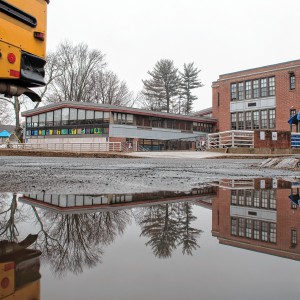Columnist Jonathan Tucker: Nation needs reasonable gun regulations
| Published: 07-03-2017 12:15 AM |
The recent Second Amendment event in Belchertown has spurred some community discussion, if not a lot of real dialogue, and some introspection (“Second Amendment rally in Belchertown draws ‘toughest sheriff,’ gun rights activists,” June 19).
Gun owners who belong in neither of the obvious camps have mostly been silent. But I don’t think we can justify that silence any longer, so here goes. Understand that I am an enthusiastic gun owner. I am fascinated by their history (a significant window into the history of the Valley), and even their aesthetics. I love to hunt. I enjoy shooting at local ranges. Some of the best times of my life have been spent with friends and family out in the field or at the range.
However, the rules of gun ownership I learned when young came with a powerful and absolute message about responsibility. Gun safety is always the central issue. If less-than-responsible gun ownership threatens people’s safety, that perverts what gun ownership is about and it has to be addressed, including through reasonable regulations.
I’m a historian, too, and have been interested in guns for a long time, so I’ve researched the Second Amendment. Almost everybody who talks about the Second Amendment misunderstands or misrepresents what it means, often on purpose. It’s not that complicated, but it’s not what you’d expect. The Second Amendment was added to the Constitution for two reasons.
First, as part of the Bill of Rights, the Second Amendment was intended to reassure citizens nervously considering ratification of the Constitution. The Constitution proposed a strong central federal government. The Bill of Rights was added to show that citizens that their most important individual rights would be protected under that new form of government. So, among other individual rights, the Bill of Rights affirmed the existing common law right of individual citizens (mostly white male property owners, at the time) to keep and bear arms for legitimate individual purposes — self-defense, defense of the home and property, hunting, and recreation. Doing so helped to get the Constitution ratified.
Secondly, by affirming that individual right, the Second Amendment sought to ensure that citizens could be armed, and familiar enough with arms that, at need, they could defend their legitimately constituted government as members of an organized and trained (“well regulated”) militia. That “well regulated militia” preamble was a hoped-for outcome. It was not a precondition for or a limitation on the individual right, which stood on its own. Despite a brief judicial vogue for the “militia-only” theory during the mid-20th century, the Second Amendment was never intended to restrict the keeping and bearing of arms to militias or their members. It was always first and foremost an individual right — “the right of the people to keep and bear arms shall not be infringed.”
The Second Amendment was also never intended to be a means by which disgruntled citizens could take up arms against their legitimate government. The exact opposite is true, as both the Whiskey Rebellion and Shays Rebellion demonstrated. Thomas Jefferson’s fiercely fanciful notion that “the tree of liberty must be refreshed from time to time with the blood of patriots & tyrants” and Hamilton’s (and others’) discussions of the deterrent effect of armed citizens on the ambitions of those who would be kings by force has been twisted into a we-have-guns-so-we-can-stop-anybody-we-think-is-a-tyrant notion. That’s a perversion of the framers’ intent, unsupported by any of our history or our case law on the Second Amendment.
Unlike other framers like Washington and Hamilton, Jefferson never had to take direct personal responsibility for the consequences of armed conflict. As ambassador to France during the French Revolution, he supported that revolution long after its ideals had dissolved into grotesquely vengeful blood-letting. He never came to terms with that failure, and it shows in his bloodier musings.
Article continues after...
Yesterday's Most Read Articles
 Treehouse, Big Brothers Big Sisters turn race schedule snafu into positive
Treehouse, Big Brothers Big Sisters turn race schedule snafu into positive
 Northampton man will go to trial on first-degree murder charge after plea agreement talks break down
Northampton man will go to trial on first-degree murder charge after plea agreement talks break down
 Area property deed transfers, April 25
Area property deed transfers, April 25
 Contentious dispute ends as Hampshire Regional schools, union settle on contract
Contentious dispute ends as Hampshire Regional schools, union settle on contract
 South Hadley’s Lauren Marjanski signs National Letter of Intent to play soccer at Siena College
South Hadley’s Lauren Marjanski signs National Letter of Intent to play soccer at Siena College
 Primo Restaurant & Pizzeria in South Deerfield under new ownership
Primo Restaurant & Pizzeria in South Deerfield under new ownership
Finally, even the most recent Supreme Court opinion (Heller v. D.C.), penned by the late Justice Antonin Scalia, explicitly states that the Second Amendment is (and has always been) subject to reasonable regulation, just like every other individual constitutional right. We can’t regulate individual constitutional rights out of existence (though some may try), but we are required to balance individual rights against the needs of society at large. It has always been a moving, precarious balance. It always will be.
Those who rallied in Belchertown to praise disgraced Sheriff Joe Arpaio were mostly making up what they wanted to be true about the Second Amendment and the world. For the most part, they simply got it wrong. But so do those who, appalled by the toll of gun violence (but without any real background in the matter), agitate for just getting rid of the awful thing and making it go away.
Neither of those sides is ever going to win, because neither is seeking a collective future based on what is real in our history and law, or on what is politically or practically possible. What must happen — and I believe will happen, after years of hard work — is the development of reasonable, consistent gun regulations nationwide. It is something the Second Amendment allows and the Constitution expects.
The conflict over what gun rights are or ought to be is not going to go away. As the Belchertown event showed, constitutional rights become a vehicle for people’s identities. Proposing to change them in fundamental ways becomes an intolerable assault on personal identity and the America that people insist their own world view defines (this happens with the First Amendment and the rest, as well).
With respect to the Second Amendment, those of us who claim to be informed and responsible gun owners are going to have to carry most of the freight during the years of effort it will take to create reasonable, consistent gun regulations. In the process, we can expect to catch bad words, mud, stones, and worse things flung by folks on all sides of the question who can only tolerate the notion of a future society formed around their own preferences. It’s better to know that going in. But we have to go in.
In the end, being an American is about being a responsible citizen in a diverse, pluralistic society. That’s not at all a modern notion — it’s what the framers were talking about all along. And while gun ownership is an important part of citizenship for some of us, being a responsible citizen is a much bigger, more complicated, and challenging task. Simply owning a gun is not enough.
Jonathan Tucker, of Florence, is a native of Amherst and a writer, musician, ecologist and historian.

 Columnist Susan Wozniak: Rising costs long ago swamped hippie ideal
Columnist Susan Wozniak: Rising costs long ago swamped hippie ideal Guest columnist Rudy Perkins: Dangerous resolution pins ‘aggression’ on Iran
Guest columnist Rudy Perkins: Dangerous resolution pins ‘aggression’ on Iran David Kirk: Northampton schools spending beyond means
David Kirk: Northampton schools spending beyond means Richard Clifford: We all need to look in a mirror first
Richard Clifford: We all need to look in a mirror first
